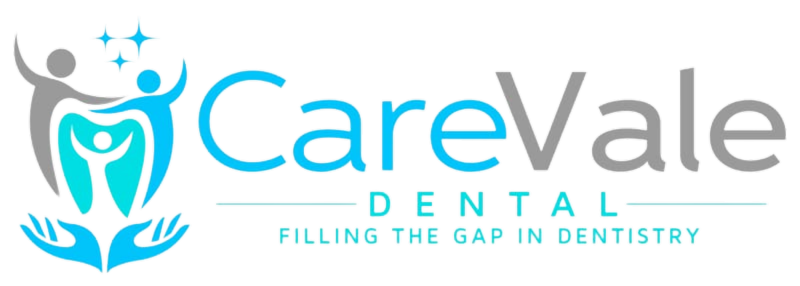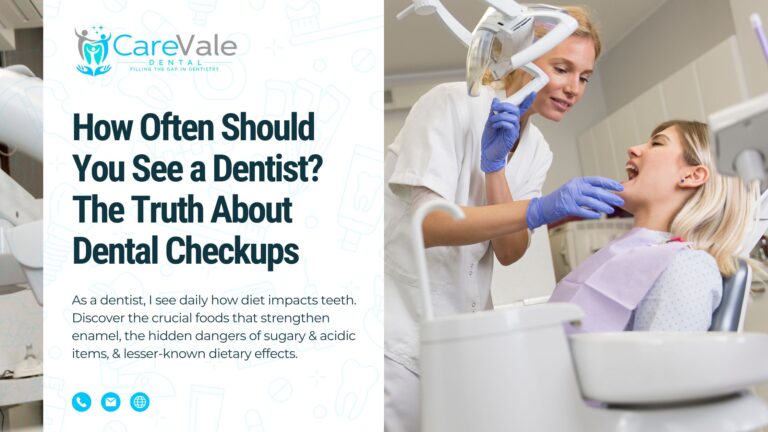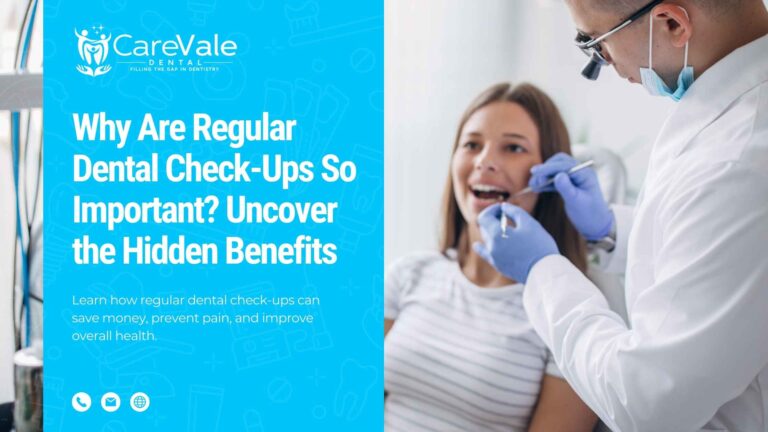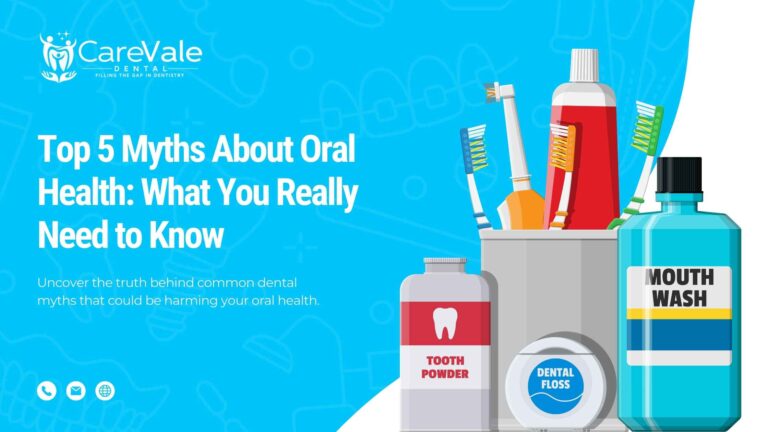Call us: 095083 92120 / Email us: carevaledental@gmail.com
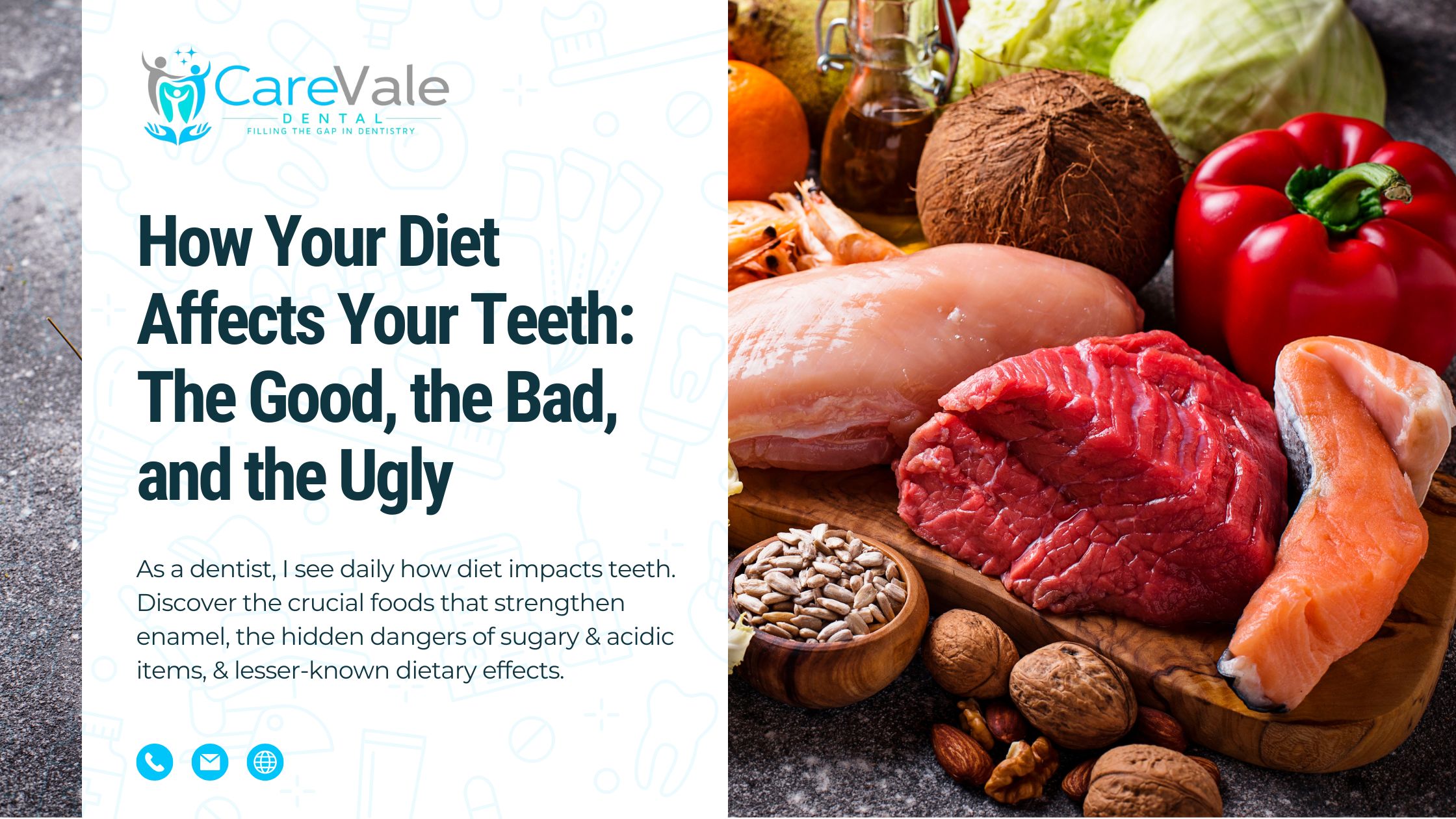
How Your Diet Affects Your Teeth: The Good, the Bad, and the Ugly
As a dentist, I often find myself discussing more than just brushing and flossing with my patients. While these are certainly crucial for maintaining oral health, I’ve come to realize that many people underestimate the profound impact their diet has on their teeth. It’s a common misconception that only sugary treats pose a threat. The truth is, that the relationship between your diet and dental health is far more complex and nuanced.
In this article, I want to shed light on the intricate ways various foods and drinks affect your teeth – the good, the bad, and yes, even the ugly. My goal is to provide you with a comprehensive understanding of how your dietary choices can either strengthen or weaken your smile. I’ll delve into the specifics of what you should be eating, what you should be avoiding, and some lesser-known dietary impacts that might surprise you. So, let’s explore the powerful connection between your plate and your pearly whites.
The Good: Foods That Strengthen Your Teeth
When we talk about strengthening teeth, the conversation inevitably begins with nutrition. I often emphasize to my patients that a well-balanced diet is the cornerstone of robust oral health. Let’s delve into the specific foods that can actively contribute to a stronger, healthier smile.
Calcium-Rich Foods:
Calcium is, without a doubt, the bedrock of strong teeth and bones. I consider it essential for the remineralization process, which repairs and strengthens enamel. In the context of the Indian diet, we’re fortunate to have access to a wealth of calcium sources. Dairy products like milk, yogurt, and paneer are excellent choices. Leafy greens such as spinach and kale, as well as sesame seeds, also provide significant amounts of calcium. Furthermore, many foods are now fortified with calcium, which can be a valuable addition to your diet. According to the National Institutes of Health, adequate calcium intake throughout life can help prevent tooth loss and maintain bone density.
Phosphorus-Rich Foods:
While calcium takes center stage, phosphorus plays a crucial supporting role. It works in tandem with calcium to build and maintain strong teeth. Nuts, seeds, and whole grains are excellent sources of phosphorus. Incorporating these into your daily meals can significantly enhance your dental health.
Vitamin D:
Vitamin D is vital for calcium absorption. Without sufficient vitamin D, your body struggles to utilize the calcium you consume. Sunlight is a primary source of vitamin D, but it can also be obtained through certain foods, like fortified dairy products and some fatty fish. Ensuring adequate vitamin D levels is crucial for maximizing the benefits of calcium.
Fibrous Fruits and Vegetables:
I frequently recommend fibrous fruits and vegetables like apples, carrots, and celery. These foods act as natural cleansers, gently scrubbing away plaque and food particles. They also stimulate saliva production, which is a natural defense mechanism against acids and bacteria. Saliva helps neutralize acids and wash away debris, protecting your enamel. The chewing action required for these foods also strengthens your jaw muscles. Therefore, incorporating these into your daily diet is a simple yet effective way to maintain oral hygiene and strengthen your teeth.
The Bad: Foods and Drinks That Harm Your Teeth
Now, let’s turn our attention to the ‘bad’ – the foods and drinks that can significantly compromise your dental health. As a dentist, I see the consequences of these dietary choices daily, and I believe it’s crucial to understand the risks.
Sugary Foods and Drinks:
I cannot overstate the detrimental effects of sugar on your teeth. When you consume sugary foods or drinks, the bacteria in your mouth feed on that sugar and produce acids. These acids erode your enamel, leading to cavities. In the Indian context, this includes a wide array of sweets, from traditional mithai to sugary beverages like sweetened tea and fruit juices. According to some studies, the prevalence of dental caries in India is alarmingly high, and excessive sugar consumption is a major contributing factor. I always advise my patients to limit their intake of sugary substances and to rinse their mouths with water afterward.
Acidic Foods and Drinks:
Acids, independent of bacterial action, can also erode your enamel. Citrus fruits, vinegar-based foods, and carbonated drinks are prime examples. Frequent consumption of these items can lead to significant enamel loss over time. I often see patients with noticeable enamel erosion due to excessive intake of acidic beverages. Additionally, acid reflux can contribute to this problem, as stomach acid can come into contact with the teeth.
Starchy Foods:
While not as obviously harmful as sugar, starchy foods can also pose a threat. Starches break down into sugars in the mouth, providing fuel for bacteria. Foods like white bread, potatoes, and rice, especially sticky varieties, can adhere to your teeth and contribute to plaque formation.
Spicy Foods:
While spices themselves aren’t inherently bad, extremely spicy foods can irritate sensitive gums. Some spicy sauces are also highly acidic, which can exacerbate enamel erosion. Additionally, certain spices can lead to staining over time. It’s important to be mindful of the type and frequency of spicy food consumption, especially if you have sensitive teeth or gums.
The Ugly: Lesser-Known Dietary Impacts
Now, let’s explore some of the ‘ugly’ truths – the lesser-known dietary impacts that often fly under the radar. These are the aspects of diet that, while not as immediately obvious as sugar or acid, can still have a profound effect on your dental well-being.
Dehydration and Dry Mouth:
I frequently emphasize the importance of saliva to my patients. Saliva is a natural defense mechanism, washing away food particles and neutralizing acids. Dehydration, or the use of certain medications that cause dry mouth, can severely compromise this defense. When your mouth lacks sufficient saliva, you’re at a significantly increased risk of cavities and gum problems. I advise patients to stay well-hydrated throughout the day and to discuss any medications that may be causing dry mouth with their doctor.
Nutrient Deficiencies:
Beyond calcium and vitamin D, other nutrient deficiencies can also take a toll on your oral health. A lack of vitamin C, for example, can lead to gum inflammation and bleeding. Inadequate intake of other vitamins and minerals can also affect tooth development and gum health. I always recommend a balanced diet to ensure you’re getting all the nutrients your body needs.
Excessive Snacking:
I often find that frequent snacking is a hidden culprit behind dental problems. Every time you eat, you provide fuel for the bacteria in your mouth. Constant snacking, especially on sugary or starchy foods, creates a continuous acid attack on your enamel. Snacking without brushing or rinsing afterward exacerbates this issue. I advise my patients to limit snacking and to choose healthy options like fruits and vegetables when they do snack.
Eating Disorders:
Eating disorders, such as bulimia, can have devastating consequences for dental health. Repeated exposure to stomach acid during purging can severely erode enamel, leading to significant tooth damage. I want to stress that if you or someone you know is struggling with an eating disorder, seeking professional help is crucial, both for overall health and dental well-being.
Certain Medications:
I have seen that numerous medications can have side effects that impact oral health. Some medications can reduce saliva flow, leading to dry mouth. Others can cause gum inflammation or even discoloration of the teeth. It is important to discuss any potential side effects with your doctor or pharmacist and to maintain regular dental checkups.
Practical Tips for a Healthy Diet and Strong Teeth:
Now that we’ve explored the various ways diet impacts your teeth, I want to leave you with some practical tips for incorporating healthy habits into your daily life. As a dentist, I believe that proactive measures are key to preventing dental problems.
Emphasize a Balanced Diet:
I always advocate for a well-rounded diet that includes a variety of nutrient-rich foods. Focus on whole grains, lean proteins, and plenty of fruits and vegetables. This approach ensures you’re getting the essential vitamins and minerals needed for strong teeth and healthy gums.
Hydrate with Water:
I cannot stress enough the importance of water. It’s the best beverage for your overall health, including your dental health. Water helps rinse away food particles and neutralize acids. I recommend drinking plenty of water throughout the day, especially after meals.
Limit Sugary and Acidic Foods and Drinks:
I understand that completely eliminating these items can be challenging, but moderation is key. Reduce your intake of sugary sweets, sodas, and acidic beverages. When you do indulge, rinse your mouth with water afterward.
Regular Dental Checkups and Professional Cleanings:
I want to emphasize that even with the best dietary habits, regular dental checkups are essential. Professional cleanings remove plaque and tartar buildup, which can lead to cavities and gum disease. I advise my patients to schedule appointments at least twice a year.
Chew Sugar-Free Gum:
I often suggest chewing sugar-free gum after meals. It stimulates saliva production, which helps neutralize acids and wash away food particles. Look for gums sweetened with xylitol, which has been shown to have additional dental benefits.
Rinse Your Mouth After Eating Acidic or Sugary Foods:
I tell my patients that a simple rinse with water after consuming acidic or sugary foods can make a significant difference. It helps to neutralize the acids and washes away food debris, protecting the enamel. This is a very simple and effective way to improve your oral hygiene.
Conclusion
In conclusion, I hope this article has shed light on the profound connection between your diet and your dental health. As I’ve discussed, the impact of food and drinks on your teeth extends far beyond the obvious culprits like sugary sweets. From the strengthening power of calcium-rich foods to the erosive effects of acidic beverages, every dietary choice plays a role in the health of your smile.
I want to reiterate that proactive dental care, coupled with a balanced diet, is the most effective approach to maintaining oral health. By understanding the ‘good,’ the ‘bad,’ and the ‘ugly’ aspects of dietary impacts, you can make informed decisions that benefit your teeth and gums.
I encourage you to take these insights to heart and make positive changes to your eating habits. As always, I am here to provide personalized advice and support. If you have any concerns or questions about your dental health, I urge you to schedule an appointment. Together, we can work towards achieving and maintaining a healthy, vibrant smile for years to come.
Frequently Asked Questions (FAQ)
Q: I love Indian sweets (mithai). How often can I eat them without harming my teeth?
A: “As a dentist, I understand that Indian sweets are a part of our culture. However, they are also very high in sugar, which can lead to cavities. I recommend enjoying them in moderation and rinsing your mouth with water immediately after. It’s best to limit your consumption to special occasions and avoid frequent snacking on sweets.”
Q: I drink a lot of chai (tea) with sugar. Is this bad for my teeth?
A: “Yes, unfortunately, sweetened chai can contribute to dental problems. The sugar in chai provides fuel for bacteria, leading to acid production and enamel erosion. I advise reducing the amount of sugar you add to your chai or opting for unsweetened versions. If you cannot avoid sweetened tea, rinse your mouth with water afterward.”
Q: I eat a lot of spicy food. Does this affect my teeth?
A: “While spices themselves are not inherently harmful, extremely spicy foods can irritate sensitive gums. Additionally, some spicy sauces are highly acidic, which can erode enamel. I recommend being mindful of the type and frequency of spicy food consumption. If you experience any discomfort, consider reducing your intake.”
Q: I don’t like milk. What are other good sources of calcium for strong teeth?
A: “I understand that not everyone enjoys milk. Fortunately, there are many other excellent sources of calcium. In the Indian context, you can include paneer (cottage cheese), yogurt, leafy greens like spinach and kale, sesame seeds, and fortified foods in your diet. These options provide ample calcium for maintaining strong teeth and bones.”
Q: Are fruit juices healthy for my teeth?
A: “While fruit juices contain vitamins, they are also high in natural sugars and acids. Frequent consumption can lead to enamel erosion and cavities. I recommend consuming whole fruits instead, as they provide fiber and are less concentrated in sugar. If you do drink fruit juice, dilute it with water and drink it with a meal rather than sipping it throughout the day.”
Q: How does eating rice impact my teeth?
A: “Rice, especially white rice, is a starchy food. Starches break down into sugars in the mouth, which can contribute to plaque formation and cavities. I recommend opting for whole grain rice, which is less processed and has more fiber. Also, make sure to brush and floss thoroughly after meals that include rice.”
Q: I have dry mouth. What can I do to protect my teeth?
A: “Dry mouth significantly increases your risk of cavities. I recommend staying well-hydrated by drinking plenty of water. You can also chew sugar-free gum to stimulate saliva production. If your dry mouth is due to medication, discuss it with your doctor. I can also recommend saliva substitutes or special mouthwashes to help alleviate the dryness.
Q: How often should I visit the dentist for a checkup?
A: “I advise my patients to come in for a checkup and professional cleaning at least twice a year. Regular visits allow me to detect and address any potential problems early on, preventing more serious issues from developing.”
